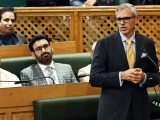
Unemployment Crisis in IIOJK Highlights Economic Struggles Amid Claims of Prosperity
November 6, 2024With unemployment at 18.3% in Indian-administered Kashmir, over a million youth are turning to roadside stalls for survival.
Despite Indian Prime Minister Narendra Modi’s promises of economic growth, the job market in Indian-administered Jammu and Kashmir (IIOJK) faces severe challenges, with unemployment reaching an alarming rate of 18.3%—double India’s national average. This high unemployment rate has forced many educated young people to resort to low-income work, highlighting the region’s ongoing economic hardships.
One striking example is Maqsood Ahmad Ganai, a PhD holder in botany with nearly a decade of teaching experience, who has been unable to secure even a temporary academic position. Ganai now sells fresh apple juice from a street stall to tourists in Srinagar. His story underscores the limited opportunities for educated youth in IIOJK, who are often forced to take up work far below their qualifications.
In 2018-2019, just before the removal of partial autonomy, the unemployment rate in Indian-administered Kashmir was 5.1%, according to the Indian Ministry of Statistics. However, with the current unemployment rate at 18.3% in a population of 7 million, over a million young people, like Ganai, are resorting to desperate measures, such as opening roadside stalls, to survive.
The prolonged economic crisis is exacerbated by over three decades of unrest in the Muslim-majority region, where resistance to Indian rule remains strong. Economic experts like Nisar Ali attribute the high unemployment rate to the government’s “misplaced priorities,” emphasizing large infrastructure projects that create few local jobs while overlooking critical sectors such as tourism and agriculture, which are vital to IIOJK’s economy.
With few job prospects matching their qualifications, educated young people in IIOJK are increasingly forced to look for work outside the territory or remain jobless, revealing a deep systemic failure. Many analysts argue that Modi’s policies have overlooked the territory’s economic needs, intensifying the frustration of Kashmiris who are struggling to find sustainable employment and better livelihoods.

